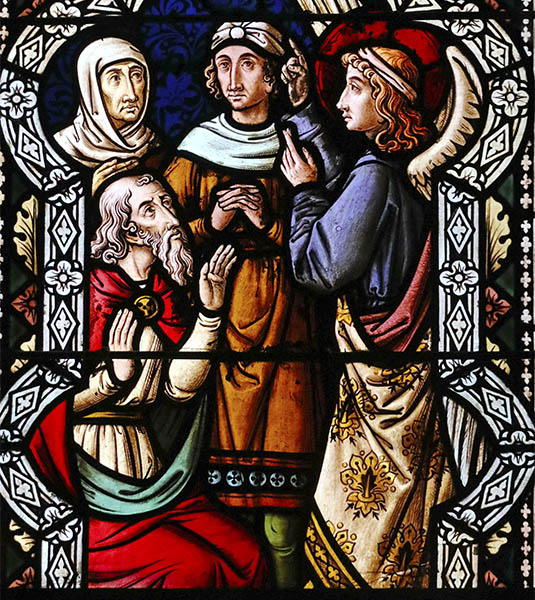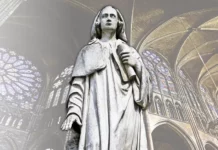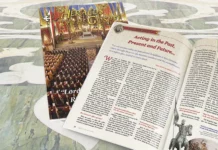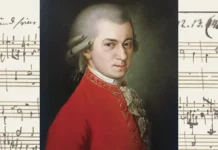To accept the divine plan with unpretentiousness and fidelity, despite every misfortune, moves the heart of God – the first to give us the example of generous and selfless love.
When we consider the lives of the providential men of history, we realize that confidence was the common denominator that marked the journey of each one. So it was with the holy patriarchs, the prophets, the judges, the Apostles, the holy women, the martyrs… and finally, with the innumerable souls who throughout the centuries remained faithful to Him who had given them a special vocation, consummated in the fulfilment of a promise.
We can even affirm that this pathway opened with our first father when, after original sin, he received the announcement of the coming of a Redeemer. He went through this sorrowful valley of tears, doing penance for his fault, sustained by the hope that one day God’s promise would finally be fulfilled. Adam confided and, as a result, had among his descendants a line of souls called to shine through their heroic conviction of victory, despite every appearance to the contrary.
As part of this vast kaleidoscope of men and women of confidence that have appeared throughout history, we will now consider the figure of an Old Testament personage who marked the pages of Holy Scripture with his example.
An upright and faithful soul
Among the Jews taken captive to Nineveh by the Assyrians was a righteous and God-fearing man who had remained faithful to the Law since childhood. Tobit was the name of this man of exemplary virtue.
To lead a virtuous life in the midst of the horror of the Gentile world was a trial before which many Jews prevaricated, eventually succumbing to the prevailing opinion in the face of evil. Nevertheless, Tobit preserved his soul from the depravity of the pagans who lived around him.
Now, “because I remembered God with all my heart” (Tb 1:13), the Most High gave him proofs of special protection: Tobit earned a degree of benevolence from the Assyrian king and, therefore, he had greater freedom in Ninivite society. He used it to strengthen, console and encourage the few remaining good souls in that harsh trial of exile.
Unpretentious “conqueror” of God
Unpretentious and generous, he dedicated himself to his brethren with unparalleled solicitude, mindless of his own comfort. He always cherished the hope that God would gather together in a new Jerusalem His exiled people scattered throughout the nations (cf. Jer 31:10-40).
However, for great vocations it is not enough to be fearless before men; it is necessary to climb the pinnacle of heroism, “conquering” God. Indeed, because – O mystery! – at times Divine Providence is pleased to be “indifferent” to His own cause, and to appear to be the enemy of those who most zealously fight for His glory… Nevertheless, His true intention is to foster in these souls the radiance of a virtue which is absolutely irresistible to Him: unpretentiousness!
To fight, then, with invincible perseverance in spite of all misfortunes, having as one’s sole objective the triumph of God on earth, moves the Creator – the first to give us the example of infinite and selfless love. By giving us His Only-begotten Son, He rescued us from the death which befell us by our own fault. Tobit was subjected to this test of unpretentiousness when, despite his good deeds, he became blind.
This man who had always done good received in recompense the loss of his sight? What evil had he done to deserve such misfortune? If he had not been an upright and holy man, his attitude towards this tragic accident would have been one of revolt and non-conformity. How his soul must have been clouded by repeated displays of incomprehension on the part of those closest to him!
Only a soul adorned with heroic confidence could discern and accept the designs of the Most High in that situation. Tobit knew how to offer his “yes” to the divine will, for “whereas he had always feared God from his infancy, and kept His commandments, he repined not against God because the evil of blindness had befallen him, but continued immoveable in the fear of God, giving thanks to God all the days of his life” (Tb 2:13-14).

The kindness characteristic of detached souls
Some time later, feeling death approaching, Tobit realized that he must prepare his son, Tobias, to take over as head of the family. Calling him, he sought to by means of counsel to establish in his soul everything he had already transmitted to him by example.
Then, although aware of the risk of dying in his son’s absence, he charged him to undertake a journey to seek the return of a loan which, after his death, would provide some stability for his wife.
By this attitude, characteristic of disinterested souls, Tobit demonstrated the great kindness of his spirit and his complete abandonment into the hands of Providence. And because he knew how to give admirable proofs of self-denial, caring more for the welfare of others than for himself, he soon saw the fruits of his edifying act of generosity!
His decision was confirmed when a “beautiful young man” (Tb 5:5) who was willing to accompany his son on the journey presented himself, and Tobit bid Tobias farewell, certain that he would soon have him back safe and sound.
Thus began the adventure of Tobias, who would later obtain many victories thanks to the shining faith of his holy father. Who knows if it was not this unshakeable certainty of divine protection that “obliged” God Himself to heed Tobit in all his desires?
A bitter chalice leads to victory
After the time allotted for his son’s return, Tobit began to worry: “Why is Tobias so late? Why does he linger far from his parents?”
However, many things happened in his travels… With the help of the Archangel St. Raphael, the “faithful man” (Tb 5:4) who had offered to accompany Tobias, the future of his family was being divinely plotted. While Tobit was asked to endure the torment of waiting, his son received Sara as his wife. Together they magnificently overcame the curse that hung over her and became the parents of a blessed offspring. However, none of this was clear to him, and thus he suffered terribly from the absence of his son.
This is the moment of the consummatum est (cf. Jn 19:30) for these men of confidence: after placing themselves in the hands of the Almighty, certain that He will sustain them, they must drink the bitter cup of waiting, while the passing time pierces their hearts by seeming to negate the promise placed in their soul. And when they behold their “failure,” after having risked all without reserve, it is as if they “surrender their soul” to divine intervention in a new and more heroic act of confidence: “Even faced with my hopes not being fulfilled, I still confide! God will give the victory!”
Once the “passion of confidence” has been consummated, all desires then become reality.

End of a venerable journey
So it was with Tobit, who not only received the restitution of his loan, but also had his sight restored and his offspring multiplied. Upon returning from the journey with the fish’s gall that St. Raphael had indicated to him as medicine, and accompanied by his wife Sara, Tobias opened his father’s eyes to contemplate a much more glorious future. So Tobit declares in his prayer:
“My soul, bless thou the Lord, because the Lord our God hath delivered Jerusalem His city from all her troubles. Happy shall I be if there shall remain of my seed, to see the glory of Jerusalem. The gates of Jerusalem shall be built of sapphire, and of emerald, and all the walls thereof round about of precious stones. All its streets shall be paved with white and clean stones: and Alleluia shall be sung in its streets. Blessed be the Lord, who hath exalted it, and may He reign over it for ever and ever, Amen” (Tb 13:19-23).
Tobit’s venerable earthly journey closes with the transmission of his invincible hope to his descendants: “The destruction of Nineveh is at hand: for the word of the Lord must be fulfilled: and our brethren, that are scattered abroad from the land of Israel, shall return to it. And all the land thereof that is desert shall be filled with people, and the house of God which is burnt in it, shall again be rebuilt: and all that fear God shall return thither. And the Gentiles shall leave their idols, and shall come into Jerusalem, and shall dwell in it. And all the kings of the earth shall rejoice in it, adoring the King of Israel” (Tb 14:6-9).
The Church will triumph!
It would be difficult to narrate here, step by step, the entire unfolding of this figure’s life, marked by the sublime protection of the Archangel St. Raphael. However, the foregoing considerations are sufficient to allow us to grasp the inestimable value in God’s eyes of the confidence of His elect in the promises that He, in His infinite goodness, places in the depths of their souls.
The example of Tobit fills us with hope in the victory of the Holy Catholic Church, especially in these times when humanity has sunk into a profound forgetfulness of God. Whatever happens, the Bride of Christ will triumph, because the Divine Redeemer has promised it: “The gates of hell shall not prevail against it” (Mt 16:18). And, so that our faith may not waver in the face of trials and contradictions, let us fix our eyes on the great models of confidence that are within our reach, so that even in this life we may contemplate the heavenly Jerusalem in all its splendour. ◊







